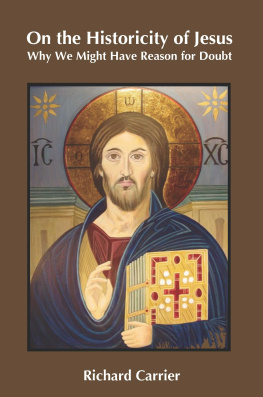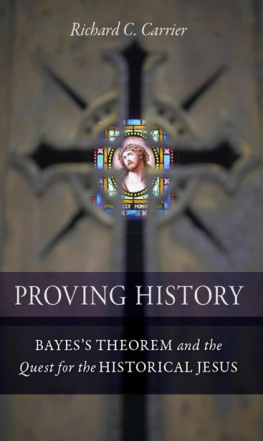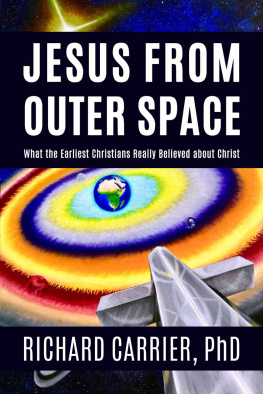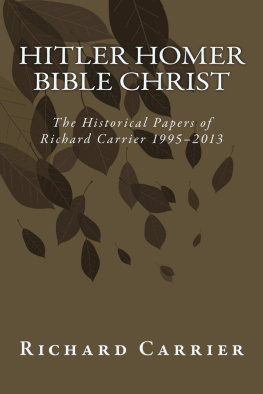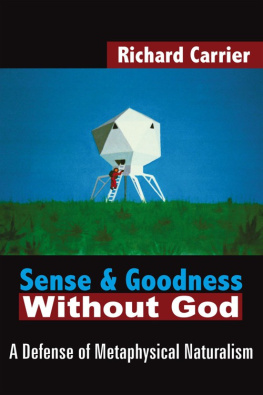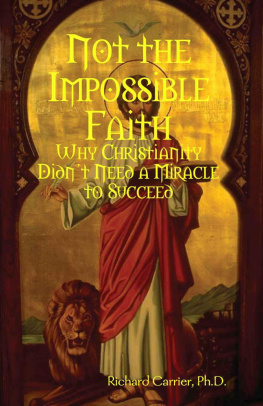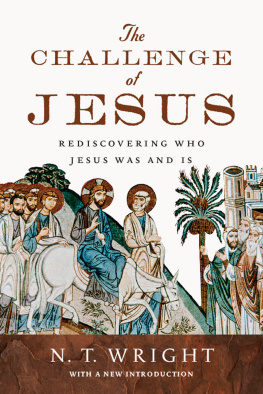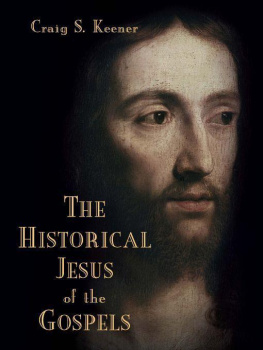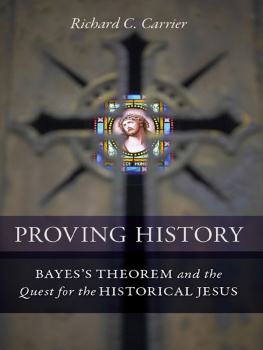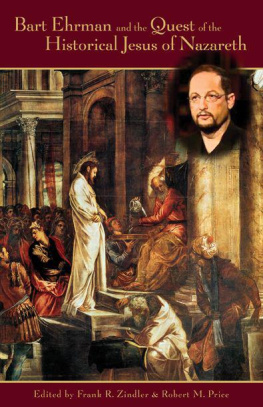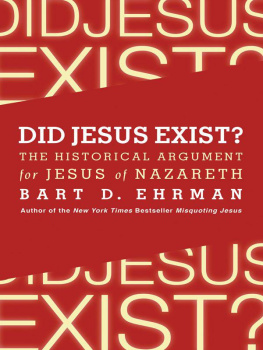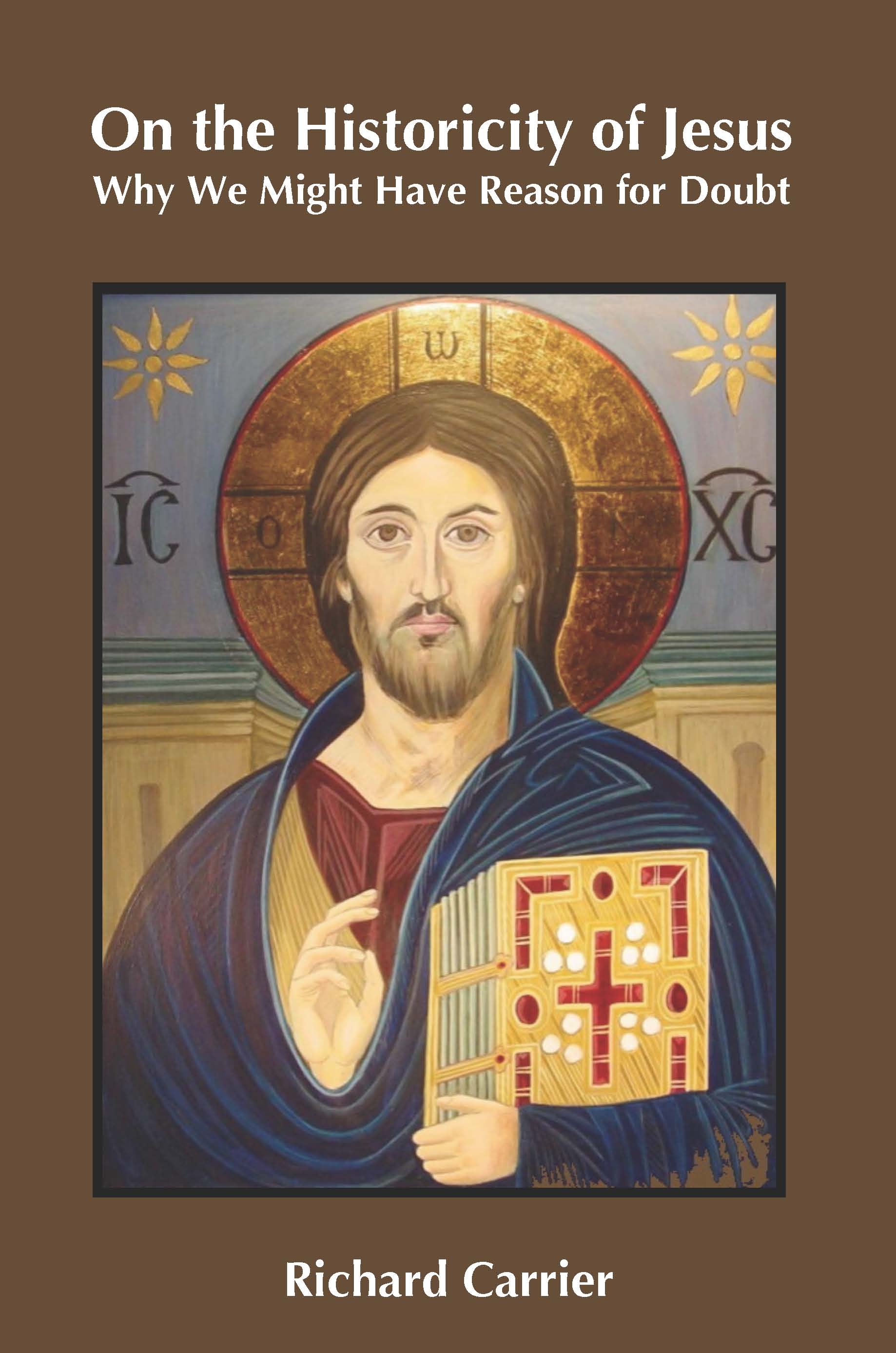On the Historicity of Jesus

Copyright 2014 Sheffield Phoenix Press
Published by Sheffield Phoenix Press
Department of Biblical Studies, University of Sheffield
45 Victoria Street, Sheffield S3 7QB
www.sheffieldphoenix.com
All rights reserved.
No part of this publication may be reproduced or transmitted in any form or by any means, electronic or mechanical, including photocopying, recording or any information storage or retrieval system, without the publisher s permission in writing.
A CIP catalogue record for this book is available from the British Library
Typeset by the HK Scriptorium
Printed by Lightning Source
ISBN 978-1-909697-35-5 (hbk)
ISBN 978-1-909697-49-2 (pbk)
ISBN 978-1-909697-70-6 (ebook)
Contents
List of Tables and Figures
Figures
Tables
Preface
This book is the second of two volumes examining a daring question: whether there is a case to be made that Jesus never really existed as a historical person. The alternative is that the Jesus we know originated as a mythical character, in tales symbolically narrating the salvific acts of a divine being who never walked the earth (and probably never existed at all). Later, this myth was mistaken for history (or deliberately repackaged that way), and then embellished over time. Though I shall argue its likely this alternative is true and that Jesus did not in fact exist, I cannot assume it has been conclusively proved here. In fact, it may yet be proved false in future work, using the very methods I employ (which were proposed and defended in my previous volume, Proving History: Bayess Theorem and the Quest for the Historical Jesus ).
Hence the point of this book is not to end the debate but to demonstrate that scholars need to take this hypothesis more seriously before dismissing it out of hand, and that they need much better arguments against it than theyve heretofore deployed. A better refutation is needed, and a better theory of historicity, which, actually, credibly explains all the oddities in the evidence. If this book inspires nothing else, I ll be happy if its that. But this book may do more. It might inspire more experts to agree with the possibility at least that Jesus Christ was born in myth, not history. And their continuing examination of the case may yet result in a growing consensus against the grain of current assumptions.
Either outcome would satisfy me. For my biases are such as to make no difference what the result should be. I only want the truth to be settled. Nevertheless, all historians have biases, and only sound methods will prevent those from too greatly affecting our essential results. No progress in historical knowledge, in fact no historical knowledge at all, would be possible without such methods. Hence my previous volume developed a formal historical method for approaching this (or any other) debate, which will produce as objectively credible a conclusion as any honest historian can reach. One need merely plug all the evidence into that method to get a result. However, because this volume cant address every single item of evidence (it merely addresses the best evidence there is), its conclusion may yet be brought down, even with its own method, simply by introducing something it omits. If so, I welcome it.
Though I already discussed my biases and background, and the origin of this project, in the preface to Proving History , for the readers convenience I shall repeat that here. I am a marginally renowned atheist, known across America and many other corners of the world as an avid defender of a naturalist worldview and a dedicated opponent of the abuse of history in the service of supernaturalist creeds. I am a historian by training and trade (I received my PhD in ancient history from Columbia University) and a philosopher by experience and practice ( I have published peer-reviewed articles in the field and am most widely known for my book on the subject, Sense and Goodness without God: A Defense of Metaphysical Naturalism ).
I have always assumed without worry that Jesus was just a guy, another merely human founder of an entirely natural religion ( whatever embellishments to his cult and story may have followed). Id be content if I were merely reassured of that fact. For the evidence, even at its best, supports no more startling conclusion. So, I have no vested interest in proving Jesus didnt exist. It makes no difference to me if he did. I suspect he might not have, but then thats a question that requires a rigorous and thorough examination of the evidence before it can be confidently declared. Most secular scholars agreeeven when they believe Jesus existed, they do not need to believe that. Believers, by contrast, and their apologists in the scholarly community, cannot say the same. For them, if Jesus didnt exist, then their entire worldview topples. The things they believe in (and need to believe in) more than anything else in the world will then be under dire threat. It would be hard to expect them ever to overcome this bias, which makes bias a greater problem for them than for me. They need Jesus to be real, but I dont need Jesus to be a myth.
Most atheists agree. And yet so much dubious argument has appeared on both sides of this debate (including argument of such a technical and erudite character that laymen cant decide whom to trust) that a considerable number of atheists approached me with a request to evaluate the arguments on both sides and tell them whose side has the greater merit or whether we can even decide between them on the scanty evidence we have. Thats how my involvement in this matter began, resulting in my mostly (but not solely) positive review of Earl Dohertys The Jesus Puzzle . My continued work on the question has now culminated in over forty philanthropists (some of them Christians) donating a collective total of $ 20,000 for Atheists United, a major American educational charity, to support my research and writing of a series of books, in the hopes of giving both laymen and experts a serious evaluation of the evidence they can use to decide who is more probably right.
The first step in that process was to assess the methods so far employed on the subject and replace them if faulty. I accomplished that in the previous volume, in which I demonstrated that the most recent method of using historicity criteria in the study of Jesus has been either logically invalid or factually incorrect, and that only arguments structured according to Bayess Theorem have any chance of being valid and sound. Here I apply that method to the evidence for Jesus and show what results.
Though this is a work of careful scholarship, the nature of its aims and funding necessitate a style that is approachable to both experts and laymen. By the requirements of my grant, I am writing as much for my benefactors as my fellow scholars. But there is a more fundamental reason for my frequent use of contractions, slang, verbs in the first person, and other supposed taboos: its how I believe historians should speak and write. Historians have an obligation to reach wider audiences with a style more attractive and intelligible to ordinary people. And they can do so without sacrificing rigor or accuracy. Indeed, more so than any other science, history can be written in ordinary language without excessive reliance on specialized vocabulary (though we do need some), and without need of any stuffy protocols of language that dont serve a legitimate purpose. As long as what we write is grammatically correct, accurate and clear, and conforms to spoken English, it should satisfy all the aims of history: to educate and inform and advance the field of knowledge. This very book, just like the last, has been written to exemplify and hopefully prove that point.

